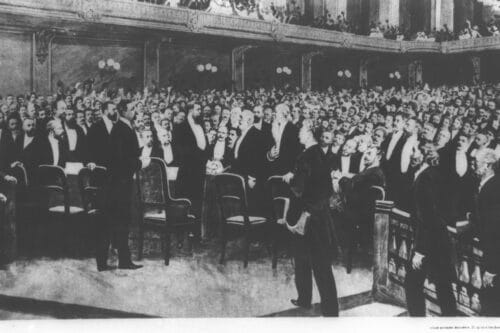
- For decades, writing about the political activities of the entrenched elites in Israel has been a no-go zone. Drawing attention to the agenda of this group has been out of bounds. But gradually and unavoidably, it has become an accepted subject of public attention as a well-organized vocal minority has been systematically targeting the unity of Israeli society to destabilize and overthrow the legally elected government. This political and social assault has effectively become the eighth front in Israel’s existential war. We can no longer ignore the danger posed by this group. We must understand the strategy of the other side and defeat it. The approach of strategic defeatism dates back to World War I when the Bolsheviks, led by Vladimir Ilyitch Lenin (1870-1924), accepted the Treaty of Brest-Litovsk, which took the Russian Empire out of the war in March 1918. The terms were draconian, with Russia losing several major territories, including Ukraine and Finland, but accepting defeat made it possible to save the Russian Revolution. According to British historian John W. Wheeler-Bennett, “The battleground was that of social struggle, and therein frontiers mattered little in comparison with the fight of the proletarian versus the capitalist …. ‘He is no Socialist,’ wrote Lenin in an open letter to American workers, ‘who does not understand that the victory over the bourgeoisie may require losses of territory and defeats. He is no Socialist who will not sacrifice his fatherland for the triumph of the social revolution.’” In August 1915, Lenin wrote that those who want revolution must work for the defeat of their own country. When he wrote, he hoped that the first uprising of the workers would break out in Imperial Germany, but it did not happen. Nevertheless, the idea is clear: …. A “revolutionary struggle against the war” is an empty and meaningless exclamation… unless it means revolutionary action against one’s own government even in time of war. One has only to think a little to understand this. And revolutionary action in wartime against one’s own government undoubtedly and incontrovertibly means not only desiring its defeat, but really facilitating such defeat….1
In early March 1918, Sir Robert Bruce Lockhart, the British consul in Moscow, first met with Lenin and recorded his personal impression:
“…. In his creed of world-revolution Lenin was as unscrupulous and as uncompromising as a Jesuit, and in his code of political ethics the end to be obtained justified the employment of any weapon. He gave me, — correctly as events proved—all the information for which I asked….
Lockhart asked Lenin about the possible outcome of the Great War, because, at that moment, it appeared that the Imperial German Army had the advantage. He then described Lenin’s reply:
“Lenin smiled. Like all your countrymen you are thinking in concrete military terms. You ignore the psychological factor. This war will be settled in the rear and not in the trenches.” 2
Later, on October 10, 1918, Lenin wrote that it was necessary to “disorganize” the army: “Not a single great revolution has ever refrained from ‘disorganizing’ the army and cannot refrain from doing so …. The first commandment of every victorious revolution, as Marx and Engels repeatedly emphasized, was: Smash the old army, dissolve it and replace it by a new one.””3
From Lenin’s reply to Bruce Lockhart, it is clear that in real time he understood the kind of war he was fighting and that it would be “settled in the rear [the home front] and not in the trenches.” Any reader of Carl von Clausewitz, On War, will remember that “this is the first of all strategic questions and the most comprehensive.”
Beyond the longer-term strategy of defeatism and seeing the battle-ground as one of social struggle, Lenin advocated the tactic of taking advantage of existing sources of discontent. He wrote: “Our task is to utilize every manifestation of discontent, and to gather and turn to the best account every protest, however small.” While the redemption of the hostages, kidnapped on October 7, has great merit inherently, the enemies of the lawfully elected government have used this method as a political weapon.
- On Thursday, April 10, 2025, a group of nearly one thousand reserve pilots and air force staff published a petition calling for the immediate release of the Israeli hostages seized and held by Hamas, even at the price of ending the current war. This really means accepting national defeat. It was reported that sixty of the signatories were in active reserves, but most of the 1,000 were veterans, no longer in service; a small number were unidentified. The headline of this petition read: “A Call for the Return of all the Kidnapped Hostages, even at the at the Price of Ending the Hostilities!” …. “We, the team of fighters of the Air Force, in the reserves and retired, demand the return of the kidnapped [hostages] without delay …. End the fighting and return all the kidnapped [persons] – Now! Every day that goes by endangers their lives. Every extra moment of hesitation is a disgrace.” Illustration of the Reservists’ Petition [At the end of this article]: Before the publication of this petition, on Tuesday, April 8, the Jerusalem Post quoted the KAN news service, as follows: “Air Force Commander Major General Tomer Bar was most troubled by one paragraph in particular: ‘At this time the war serves mainly political interests and not security interests. Continuing the war does not contribute to any of Israel’s stated war goals and will lead to the deaths of the hostages, IDF soldiers and innocent civilians.’” It was reported that Commander Tomer Bar objected to this defeatist message which accused the government of duplicity and bad faith. Its subversive language dates back to the propaganda of the First World War, namely, that government policy makers are acting under false pretenses. The Times of Israel gave the background to the petition and the official response as follows: “After its publication, Commander Tomer Bar, along with IDF Chief of Staff Lt. Gen. Eyal Zamir, moved to dismiss the active reservists who signed the letter, with the IDF saying that it has no issue with reservists protesting any matter in their civilian lives, as [long as] they do it without using the name of the military or their role.” Specifically, they objected to the use of the ‘Air Force Brand’ for political protest. On the same subject, Channel 12 independently reported that the reservists intended to publish their letter on Tuesday morning, April 8, before the hearing of the High Court of Justice on the efforts to fire [Ronen] Bar, head of Israel’s Secret Service [Shin Bet]. We must ask who really orchestrated this political initiative as well as others. Who drafted this letter? And who paid for it? Despite the fact that the signatories of this letter claim to be retired Israel Air Force staff and reservists, its real purpose was to promote defeatism by undermining public trust in the government in time of war. Furthermore, the petition of April 10 was not an isolated event. On April 14, the Jerusalem Post reported that 1790 graduates of the elite Talpiot intelligence program published a letter in support of the IAF reservists’ petition, and separately, 250 doctors in the reserves joined them. Prime Minister Netanyahu’s initial public reaction was to declare that the letter came from a noisy fringe group whose only aim is to topple the government. Nobel Laureate Professor Israel Aumann stated that this act will increase the price that Israel will have to pay for the hostages and Dr. Mordechai Kedar opined that this declaration of weakness is a gift to Israel’s enemies in the Arab world. The purpose of the Prime Minister’s pre-recorded address to the nation on Saturday night April 19 was to counter the effects of the reservists’ petition and to reiterate the government’s determination to achieve their strategic goals.
- If we look back half a century, we may learn from the strategy and tactics which the North Vietnamese used in order to manipulate American public opinion and disrupt the American home front and the orderly conduct of foreign policy. Henry Kissinger, President Richard Nixon’s National Security Advisor, wrote an autobiographical account of this era, The Washington Years (Boston, 1979), in which he documented how an aggressive and forceful domestic campaign against the war destabilized the administration and undermined its ability to govern. Kissinger’s observations show that there are real parallels between the domestic disorder which was fomented during the Vietnam War and the turmoil on the home front in Israel. The following are several of Kissinger’s observations which may apply to our present situation: “My theme was constant, that the war had to be ended as an act of policy, not in response to demonstrations”“Our opposition came from those who wanted more rapid withdrawal, if not defeat, and this destroyed our bargaining position. Our enemies would only benefit from our domestic collapse.” “We [American policy makers] acted as if the process of negotiations operated on its own inherent logic independent of the military balance –, indeed, that military pressures might jeopardize the negotiations by antagonizing our adversary or demonstrating bad faith. Nor surprisingly, a stalemate of nearly two years’ duration followed, during which our casualties equaled those we had endured when hostilities were unconstrained. Treating force and diplomacy as discrete phenomena caused our power to lack purpose and our negotiations to lack force.” On the evening of April 15, 1972, Anatoly Dobrynin, Ambassador of the Soviet Union, made a discrete visit to Kissinger’s home in order to discuss lending Soviet diplomatic support to American efforts to end the war. Requesting Russian help, Kissinger said: “Anatol, for us it isn’t just an international problem; it has now become a major domestic problem. We cannot permit our domestic structure to be constantly tormented by this country ten thousand miles away. The war must now be brought to a conclusion, and we will do it either together with the other great powers or alone.” This conversation shows that Kissinger understood the cumulative effect of a systematic campaign of domestic defeatism. It was demoralizing and dangerous. The similarities between the strategy of the North Vietnamese and that of Hamas should help us better understand the kind of war we are fighting. However, if policy makers in Israel ignore the reality of the Eighth Front, the outcome of the present war could be even more precarious.
One of obstacles that Henry Kissinger had to overcome was that Hanoi even refused to discuss American proposals and it became necessary to get the negotiations moving. In the event, massive B-52 attacks on Hanoi, in April 1972, proved to be an effective catalyst.
After devoting attention to Henry Kissinger’s lessons with regard to negotiating in general, one may reconstruct his views with regard to the petition of the reservists and the claim that accepting defeat would facilitate the immediate release of the Israeli hostages. According to Kissinger, negotiations must be supported by vigorous military force. In view of his reasoning and the lessons of his experience, it is unlikely that defeat and humiliation can bring about the return of all of our hostages.
- Based on the open sources, we can make a reasonable guess as to the motives and the methods driving today’s political warfare in Israel. It cannot be ruled out that the real goals of the so-called “Resistance” are civil war, national defeat, and revolution. Although the Soviet Union has passed into history, certain political agitators in Israel, while claiming moral superiority in the name of “democracy,” –as they understand it, — have adopted Lenin’s legacy of political warfare.
Copy of IAF Reservists’ Petition Below:

The views expressed in this article are those of the author and do not necessarily represent the views of the movement
This article was originally published in Jewish News Syndicate (jns).






